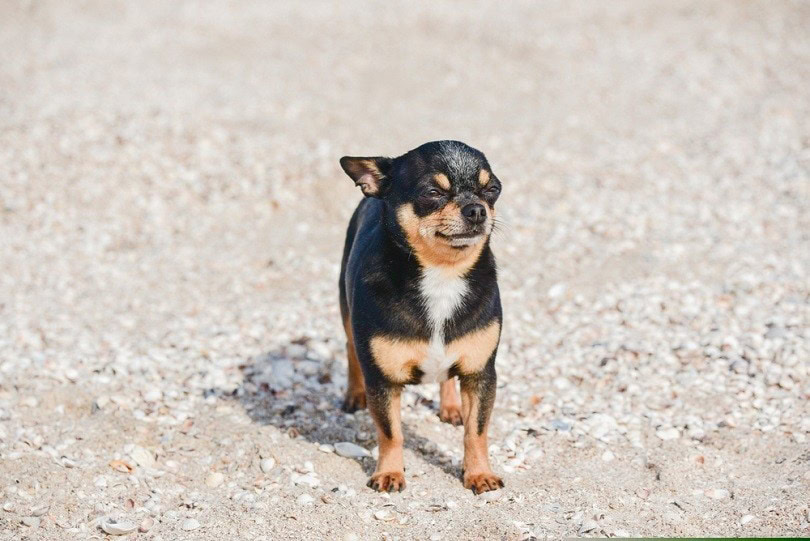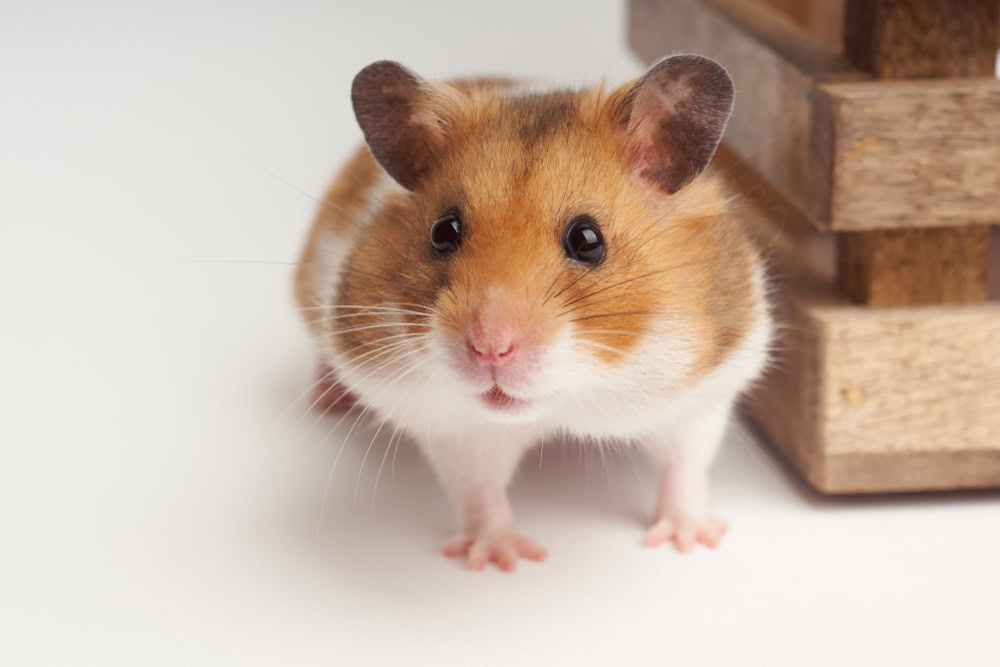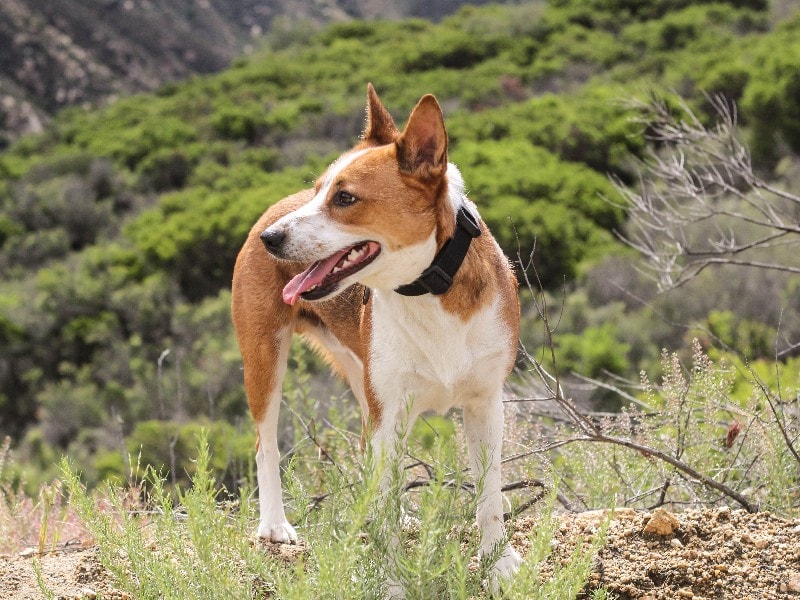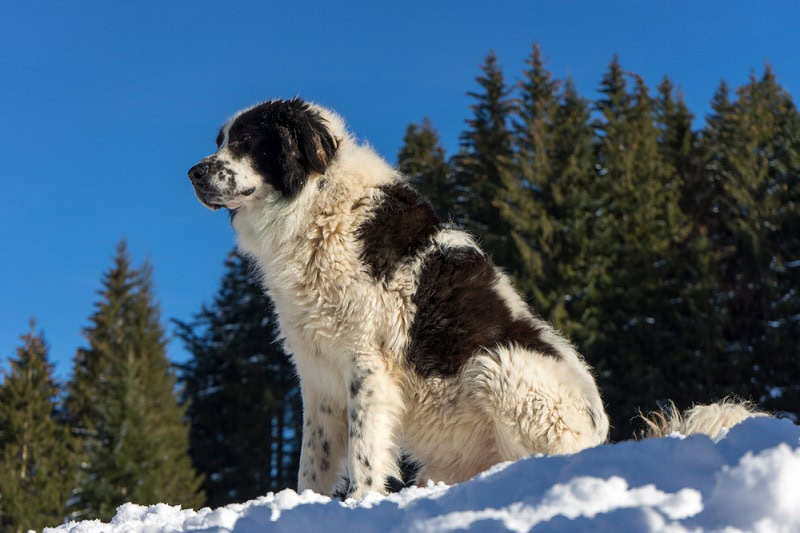Click Below to Skip Ahead
If you’re considering adopting a Chihuahua, you may be aware that they’re adorable, tiny, and cuddly, but what else do you know about this breed?
Chihuahuas are small dogs with large personalities that love nothing more than curling up in your lap or sitting by your side for a long afternoon nap. They can be great companions for children, as they are naturally gentle and patient with kids learning how to handle them. However, you need to train them from a young age, or they can become little menaces.
Breed Overview
Height
6–9 inches
Weight
3–6 pounds
Lifespan
12–20 years
Colors
White, blue, chocolate, red fawn, merle, black and tan
Suitable for
Those looking for a small pet with a comical personality
Temperament
Loyal, loving, funny, easy to train, territorial, alert
This little dog is steadily growing in popularity across North America every year. Since they’re so tiny, they make great company for people who live in apartments and don’t have much space.
But there is much more to these pint-sized pups! In this guide, we talk about everything that you need to know when it comes to Chihuahua care, from getting one as a puppy to training and feeding them.
If you’re thinking about owning a Chihuahua, read on to learn all about this surprisingly intelligent canine.
Chihuahua Characteristics

Chihuahua Puppies
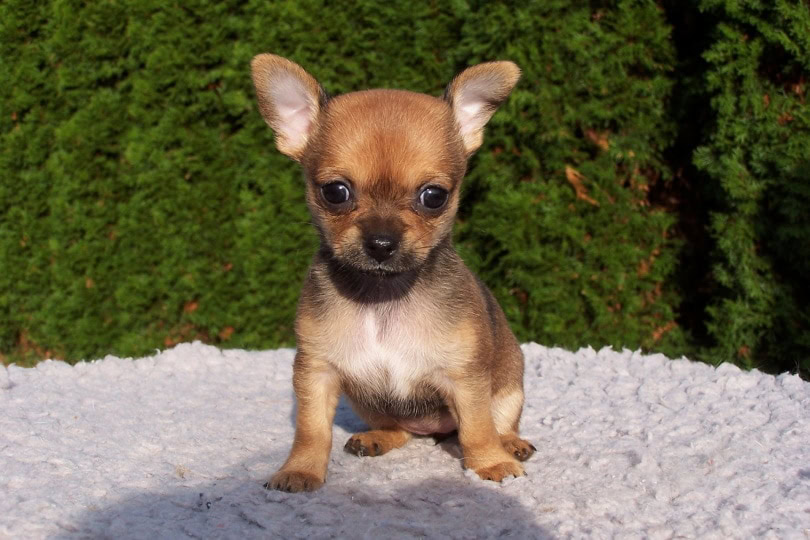
When you’re ready to adopt your puppy, there are a few different ways to go about it. You can visit your local Chihuahua rescue or contact a breed-specific breeder. The price of the puppy will vary depending on where you purchase them and their lineage. Chihuahuas can have different color variations. The rarest colors are blue and merle. On top of the adoption fees, you should also budget for first-time supplies, such as a crate, food and water bowls, etc., and veterinary care.
Chihuahuas are known for barking a lot and having an attitude around strangers. Early socialization and training are essential for them to be calm around people and other pets.

Temperament & Intelligence of the Chihuahua
Are These Dogs Good for Families? 👪
Chihuahuas are incredibly loyal and devoted creatures. Their temperament mostly depends on their upbringing and training. However, they are typically known to be courageous and bold little creatures with a zest for life. They can also be rather timid or even shy until they have become more comfortable in their surroundings.
That said, once they’ve identified their family members, the love is endless. Chihuahuas can be great with children because they are so small and their size makes them less intimidating.
But from the Chihuahua’s point of view, all children just look like big dogs, so they may be wary of those outside the family. Kids who they’ve grown accustomed to, though, will not get such harsh treatment.
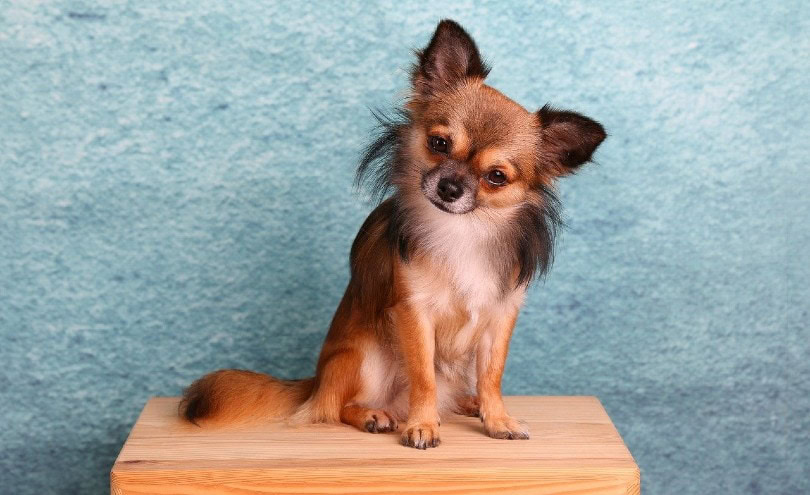
Does This Breed Get Along With Other Pets? 🐶 😽
Chihuahuas are small but feisty, often coming off as a bit bossy to humans, even their family members. They can be timid or skittish around strangers at times, though, usually due to a lack of socialization in their early stages.
Regarding other pets, it’s best to keep your Chihuahua as the sole animal inside the home, as they are territorial. That said, trying to socialize them with other pets can be beneficial for the Chihuahua in order for them to get used to non-human playmates.
It’s necessary that you supervise any interactions between your dog and any new pet or animal. This breed has a strong prey drive, so they will want to chase after squirrels, birds, lizards, and anything smaller than them!

Things to Know When Owning a Chihuahua
Food & Diet Requirements 🦴
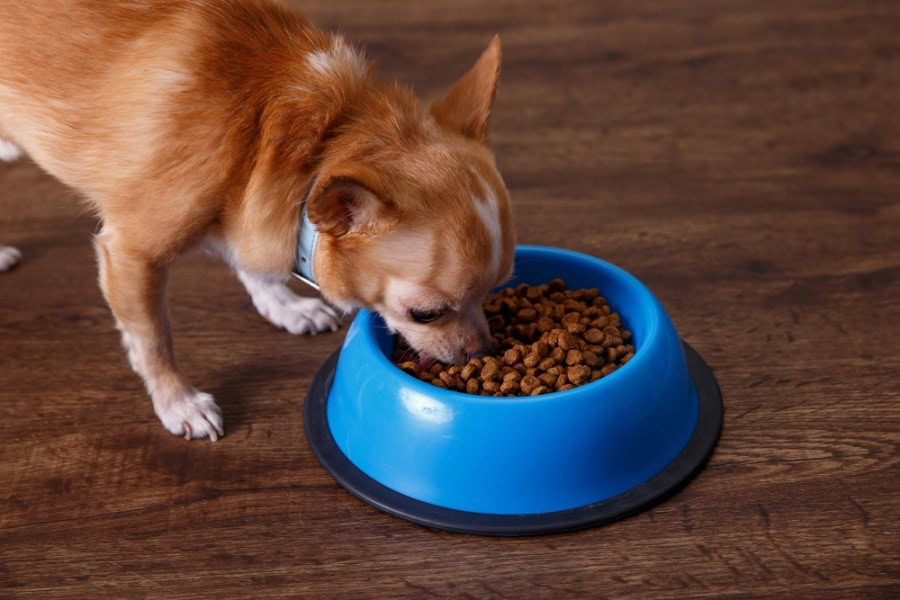
Chihuahuas are small dogs with little stomachs that don’t require much food in comparison to most other breeds. They require about 1 cup of dog food per day, split into two meals. Younger puppies will get even smaller portions four to eight times throughout the day.
One of the most important things you’ll want to do for your Chihuahua is find a good brand and type of food. They’re selective eaters, so they must have something nutritious that will satisfy their needs. Some Chihuahuas may have allergies and sensitivities to certain foods, so it’s best to consult a veterinarian if you notice an unusual reaction from your pet after they eat something.
Your pup will definitely want some of your human food, and they’ll let it be known. Table scraps are safe for Chihuahuas in small amounts, but make sure to avoid problematic foods.
- Chocolate
- Caffeine
- Onions and garlic
- Grapes
- Raw carrots, broccoli, cauliflower, and corn kernels or stalks
- Dairy products other than yogurt (including cheese)
If you are unsure whether a type of food is safe to give to your dog, check with your veterinarian.
Exercise 🐕
These little rascals are full of energy, so they must get to exercise daily. You should walk them for at least 30 minutes per day and if possible, take them out in the yard to run around!
They also love to be with their owners, so it’s important to play with them by tossing a ball or playing tug-of-war to give them the mental stimulation they crave. Don’t worry, once they get their exercise, they should sleep for about 12 hours a day!
It’s important to monitor your puppy’s energy levels throughout the day, as younger dogs can wear themselves out or get dehydrated if they play too much! As they get older, Chihuahuas will play less because of reduced energy and mobility.
Training 🎾
Chihuahuas are brilliant dogs, and as such, they’re relatively easy to train. They’ll usually come when called, but sometimes it may take several tries for them to follow the command, so be patient with your pup!
Different methods of training can work; clicker training is particularly effective for these little ones. You use a clicker to signal when the dog has done something right, and then you reward them with a treat.
Potty training can be done with urine pads and by bringing your dog outside frequently, especially after eating or drinking. Chihuahuas have small bladders, so they can’t hold it for long!
Other than that, you can teach them anything from giving the paw, sitting, shaking hands and playing dead. They are very smart little dogs and will learn quickly!
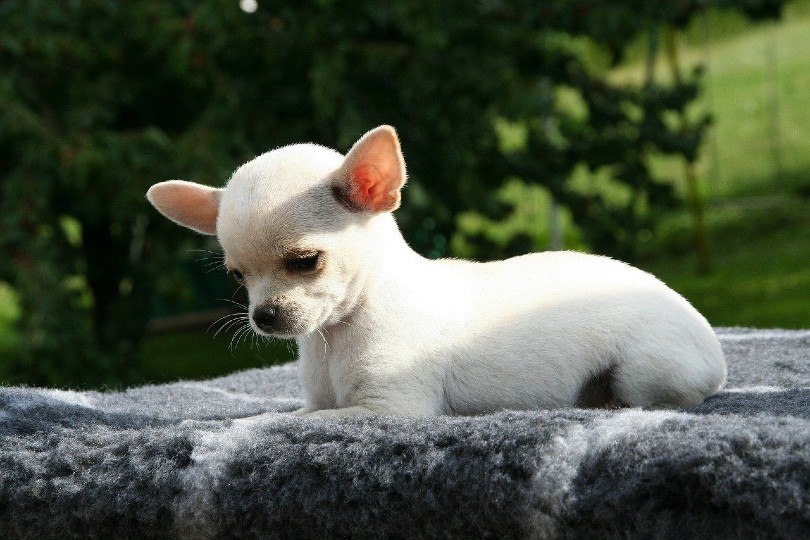
Grooming ✂️
Chicualhaus can have different coats. Long-haired specimens require brushing at least once a week, while short-haired ones don’t need it as often.
Eyecare is important for small breeds because their eyes are more easily damaged. They’re also prone to dry eye syndrome, which you can treat with artificial tears or ointments made specifically for this condition. It’s recommended that you get a yearly eye exam for your pup too.
Dental health is vital for your dog. Chihuahuas are small, so they can’t open their mouths as wide and can have trouble with dental health. Regular brushing will help prevent tartar buildup on the teeth and gum disease. Their teeth should be brushed with toothpaste made specifically for dogs.
- Related Read: Hairless Dog Breeds
Health and Conditions 🏥
- Dry or cracked skin
- Eczema
- Mange mites
- Obesity
- Diabetes
- Heart disease
- Epilepsy
- Deafness
- Hypothyroidism
- Cancer
Minor Conditions
Chihuahuas have two different types of fur, which make them prone to different types of conditions. One type is wiry and coarse hair that must be carefully groomed because it otherwise will break, giving the dog a dull coat, which then causes their skin to dry out and crack in places. This leaves areas unprotected from bacteria or parasites, so they need more grooming to be protected against these factors. The other type has soft hair that is usually more susceptible to developing skin allergies like eczema and mange mites due to their sensitive nature.
Chihuahua obesity is no laughing matter. Overfeeding your pup can lead to a slew of health problems, the most common being diabetes, turning a minor eating problem into a major health condition.
Serious Conditions
Chihuahuas can have certain breed-related health conditions that are passed through their genetics. The most common hereditary condition is heart disease, which can lead to congestive heart failure and arrhythmia. It also affects the eyes and the brain.
Other serious conditions that Chihuahuas can experience are epilepsy, deafness, and hypothyroidism. You should continuously monitor your pet’s health for any changes in behavior or appearance, as these could signal severe conditions that may require treatment.
Cancer in canines is not exclusive to any breed and can affect any dog, including the Chihuahua. After a veterinarian diagnoses cancer, they will recommend treatment options tailored for each individual case. Surgery may be recommended to remove cancerous growths or tumors, chemotherapy may be recommended for large cancers that have spread, and radiation therapy is often the first choice when treating small areas of localized cancer.
If you need help diagnosing or treating your pup’s health condition, talk to a veterinarian who is experienced with the breed.

Male vs. Female
It can be hard to tell a male from a female Chihuahua. The main difference between the two is their size. Males typically grow to about 10 inches, and females usually stay around 8 inches.
If your male pet is not neutered, you may notice that he has a more dominant personality, marking everything he can find as his. When your female reaches maturity, she can experience mood swings when in heat.
Other than that, male and female Chihuahuas behave depending on their upbringing. If they were socialized more with other pets as young pups, they are less likely to be territorial.
Naming your Chihuahua is also an interesting topic of discussion. Many people will name their pet after something related to the food they like. For example, Cheeto or Pizza are popular choices for Chihuahuas, and both of those names are unisex!

3 Little-Known Facts About the Chihuahua
1. Chihuahuas are named after the Mexican State of Chihuahua.
They were originally bred in Mexico in the mid 19th century. The original Chihuahua is thought to have been derived from the Techichi, a small mute dog kept by the Toltec people of Mexico centuries ago. Many believe that Chihuahuas grew in popularity because of their hunting skills. They love chasing rats and squirrels, for example, and they make great company!
They arrived in the U.S.A. around 1880, when Mexican merchants would sell them to tourists at the border. Today, all of America knows the Chihuahua, in part due to many celebrity endorsements.
2. There are long-haired and short-haired Chihuahuas.
The hairless variety is also referred to as a “show-style” Chihuahua. Different people prefer different types of coats, so the buyer needs to know which type they prefer before making their decision.
For example, long-haired Chihuahuas shed twice a year, while short-haired ones constantly shed, though very little. The length of the dog’s coat will also influence their grooming habits. Long-haired Chihuahuas will require weekly brushing, while short-haired ones only need to be brushed twice a month.
3. The Chihuahua is the world’s smallest breed.
This should come as no surprise, but this is the world’s smallest breed of dog. Their size was achieved by crossbreeding the Techichi with a variety of other breeds. The Chihuahua is recognized as a toy breed by the American Kennel Club, though they’re more officially considered a non-sporting dog.
Their small stature makes them popular pets for people who live in apartments or don’t want a large dog to take up space in their homes.

Final Thoughts
If you’re looking for a small dog that is loyal and active, the Chihuahua may be the perfect companion. They are affectionate when they feel respected and loved but can grow aggressive if threatened or ignored.
Their small size makes them good candidates to live in apartments, as long as there isn’t too much noise around them. It would help if you took care not to leave your Chihuahua alone all day while you’re at work. While these dogs enjoy being on laps occasionally, they also need physical activity and mental stimulation throughout the day!
Before adopting one into your home, it is important to know how they can behave in certain situations, so there isn’t any confusion or unexpected surprises. For example, if you have outside children who come over often (or strangers), this breed may not be the best choice because they tend to snap at people when they feel threatened by them, even though they bark a lot more than they bite! Likewise, these little pups can get jealous easily when treated as anything less than the ruler of everything around them, sometimes acting out against their owners or other pets.
Overall, though, when properly socialized, Chihuahuas tend to be sweethearts and make fantastic pets for almost any household.
Related Reads and Breeds:
Featured Image Credit: Lesia Kapinosova, Shutterstock
